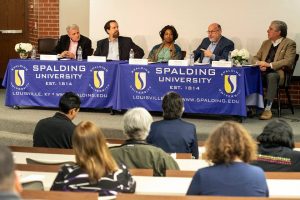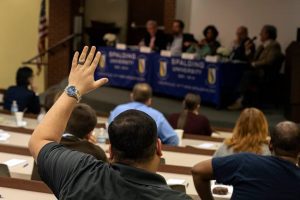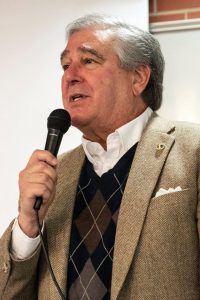With Commencement approaching on June 1, Spalding is publishing a series of stories and Q&A’s that highlight students from a range of degree programs who are set to graduate. Next up is Ashlee Clark Thompson, who is earning a Master of Fine Arts in Writing degree.
When Ashlee Clark Thompson graduates this weekend, Spalding University’s MFA in Writing program will add to its list of alumni a busy and respected journalist, writer, public speaker and social media user who believes her time at Spalding has helped hone and heighten the storytelling skills she uses daily in her career.
Thompson, the Culture Editor at Louisville Public Media, said she’ll graduate feeling more confident than ever in her writing and proud of how she’s enriched the content she produces. Further, she said, the MFA program has fostered a culture of positive feedback and workshopping that inspires her to keep writing and telling stories in her personal time.
“I walked away from this program with a greater confidence in myself as a writer, and, honestly, that’s what I wanted to get,” Clark Thompson said. “It’s a program that fosters community. I’ve formed genuine relationships with people in this program, and just the general attitude with which we treat each other as writers – to build each other up and not tear each other down – has been really good.”
LEARN about all the offerings from the School of Creative and Professional Writing
Even before earning her MFA, Clark Thompson was an accomplished writer and journalist.
She has worked at LPM and WFPL since last fall, and her job includes oversight of the Do502 events calendar. She is also the author of the book “Louisville Diners” and is one of the hosts of The Moth StorySlam, a recurring storytelling competition at Headliners Music Hall presented by WFPL. She’s also the President of Louisville Literary Arts and a frequent presence on Twitter, where she posts her takes on current events and pop culture (often accompanied by funny gifs).
Clark Thompson previously worked for the tech magazine/website CNET reviewing products and appliances, and she’s a former Lexington Herald-Leader reporter.
“Journalism school was great and taught me how to be a good reporter, but I wanted to learn how to be a better writer, and there are differences in that,” Clark Thompson said. “I knew how to go find facts and interview people and work on deadline, but I needed help learning how to tell a story. Being in Spalding’s MFA program was about enriching the work I already did.”
For instance, when she was writing for CNET, Clark Thompson said lessons from the MFA program helped her find more creative and engaging ways to write reviews about appliances and technology, and she gained the confidence to write more commentary pieces.
“Spalding taught me how to have an opinion and how to write it in a story that is compelling to read,” she said. “And I was able to combine that with my journalism background to prove my points with facts. The marriage of those two made me a much better writer and much more confident writer. I learned I can tell stories in a different way.”
Clark Thompson, who concentrated on created non-fiction, exemplifies how a working professional can earn an MFA through Spalding’s low-residency format.
During her time in the program, she’s changed jobs multiple times and said Spalding was flexible in allowing her to take time off and resume when she’s ready. During those times she did need to step away, she said, faculty kept in touch with her and that she “never felt disconnected.”
“It has been an amazing experience for me because of that flexibility,” she said. “For a lot of working people, that’s the flexibility that we need. Spalding really takes into account that life happens. You can’t control ‘fill in the blank’ circumstance – whether it’s money, family, job, travel, whatever. … As a working person, it’s awesome.”
She said the Spalding program encourages its working-professional students to draw from their experiences in their writing, and collectively, the diversity of life experiences within the MFA students – some older with established jobs and families, some straight out of undergrad and beginning their careers – creates a robust learning community. Several MFA students come from jobs outside of traditional creative writing professions.
“When all these people come together for residency, it’s an amazing experience because that is such a rich tapestry that I get to be a part of,” she said.
Clark Thompson now works downtown at Louisville Public Media headquarters, only a couple blocks from campus down Fourth Street, and only a couple doors down from the MFA residency activities at the Brown Hotel.
As Louisville native and resident, Clark Thompson said she was attracted to Spalding’s community of MFA faculty and alumni. After graduation, she envisions continuing to make quick trips over to attend MFA readings and public lectures.
“I’m super proud (to become an alumna of the program),” she said. “I want to tell people, ‘Right here in Kentucky there is this great program where you can get all this learning and do it on your terms.’ That’s what is so appealing to me. Instead of looking down on people who are may be late to writing or haven’t been writing steadily, Spalding welcomes those people.
“‘Oh, you have life experiences? Awesome, we want to teach you how to be a better writer.'”
Some more from Ashlee Clark Thompson:
What is your favorite Spalding memory?
My first workshop. Our workshop leaders at the time were Dianne Aprile and another instructor. Before we started with our workshop, they said, “The way we critique people is to give them love notes and help notes. We tell them what we love about their writing, what really worked, and then help notes of things that could be improved.” That’s something that’s really stuck with me this whole time I’ve been in this program when I approach other people’s writing but also just in general when I approach my own writing. Just being nicer to myself.
Which accomplishments are you most proud of during your time at Spalding?
Finishing. (Laughs)
What’s your favorite spot on campus?
Probably the ELC Lectorium (which is the site for many of the MFA program’s readings and presentations). I know that, OK, when I sit here, something good is about to happen.
At Spalding, we like to say that, “Today is a great day to change the world.” For many of our students, Commencement is a world-changing experience. After graduation, how do you plan to change the world, big or small, and who inspires you to be a #spaldingworldchanger?
I want to change my corner of the world. The world is such a big place, and it’s easy to get overwhelmed when you look at the news or Twitter or whatever. But I want to use storytelling to make my corner of the world a little bit better, whether it’s sharing my own story and that maybe helping others know that they aren’t alone in whatever they’re going through, or it’s amplifying the stories of others.


